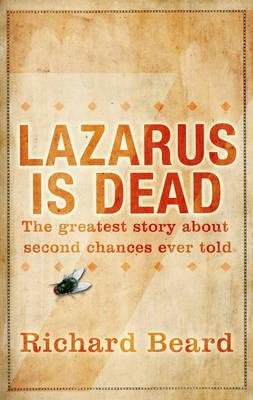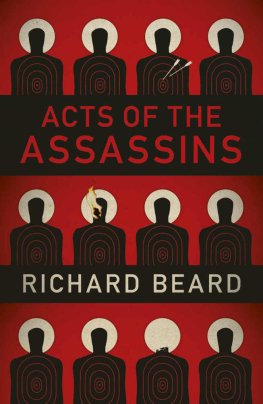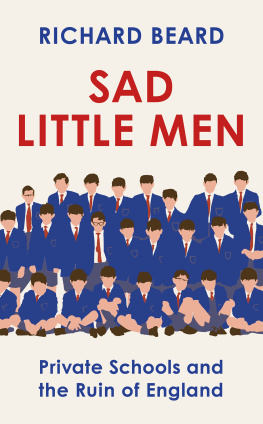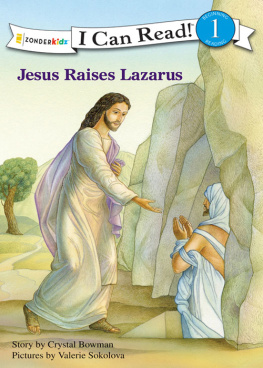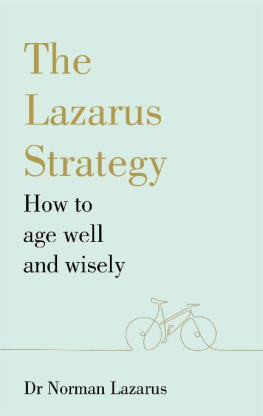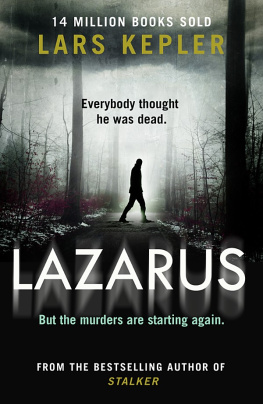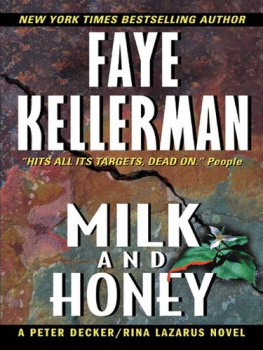Richard Beard
Lazarus Is Dead
Like most men in their early thirties, Lazarus has plans that dont involve dying. He is busy organising his sisters, his business and his women. Life is mostly good, until far away in Galilee, without warning, his childhood best friend turns water into wine.
Immediately, Lazarus falls ill. And with each subsequent miracle his health deteriorates: a nasty cough blooms into an alarming panorama of afflictions. His sisters think Jesus can help, but given the history of their friendship Lazarus disagrees. What he is sure of is that hell try everything in his power to make himself well. Except for calling on Jesus.
Lazarus dies. Jesus weeps. This part we all know.
But as Lazarus is about to find out, returning from the dead isnt easy. You think you want a second chance at life, but what do you do when you get it? Lazarus has his own story, he is his own man, and he is determined to avoid the mistakes he made the first time round.
A thrillingly inventive, genre-bending novel, Lazarus is Dead is the definitive account of the life, death and life of Lazarus, as never told before.
Richard Beard is the author of four critically acclaimed novels: X20, Damascus, The Cartoonist and Dry Bones, and three works of non-fiction: Muddied Oafs, described by Frank Keating as the book rugby has been waiting for, How To Beat The Australians and Becoming Drusilla. He is Director of the National Academy of Writing in London.
Our friend Lazarus has fallen asleep, but Im going to wake him up.
John 11:11
7
LAZARUS IS DEAD.
There is no room for doubt. He died, he came back to life, but then he died again. If he were alive today, we would know. I think.
Other certainties are harder to come by. The earliest reference to Lazarus is found in the gospel according to John, whose reliability as a historian is questionable. Among the gospel writers Mark is considered the most factually accurate. Matthew and Luke base their accounts on Mark, while John is closer to the type of writing known today as creative non-fiction.
For structural reasons, John selects seven of the best Jesus miracles and uses them to shape his narrative. He starts with the water-into-wine. Then some healing miracles, the feeding of the five thousand, the walking on water, as each miracle builds towards the climactic seventh event, the death and resurrection of Lazarus.
This is the sign that announces the arrival of the messiah.
Jesus turns water into wine at a wedding in Cana, and the next morning Lazarus opens his eyes and stares at the whitewashed ceiling. It is grey, and he has a nagging sense, this morning, of something amiss.
The feeling fades. He has too much to do, an arrangement to speak with his chief Bedouin shepherd, another trip to the city.
He leaves the house without eating, and is halfway across the village square when he hears the name of Jesus. A young man with bright eyes is balancing on a halved barrel, answering shout-out questions from a small group of villagers.
Yes, gods truth, he survived in the desert with no food or water for forty days. The river? He stands waist deep in the water and forgives the sins of the people. He is a lamb, a shepherd, bread, blood.
Who was with him?
The square falls silent. Lazarus is not like the rest of them. For an outsider, he isnt all bad, but no one expects him to stop what hes doing to listen to this kind of nonsense. He has his business interests, selling sheep to the Temple, and his powerful contacts in Jerusalem. His life is ordered, successful, unusual; he has no need of enlightenment.
The bringer of news smiles and opens out his arms. Everyone is welcome at baptism.
I mean, whos helping him? Hell have had someone with him.
John the Baptist. The messenger is confident again, now that hes safe with the facts. John the Baptist and Jesus standing side by side in the river.
Thought so. Someone else always has to go first.
Lazarus sees his shepherd Faruq at the edge of the crowd. He takes the Bedouin by the elbow and leads him away, lowers his voice. How was Jerusalem?
Faruq looks back over his shoulder, but not for long. Lazarus pays the best prices, and always finds buyers. He has Faruqs future in his hands.
Theyve reduced the quota of animals again.
Again?
Lazarus winces, rubs the back of his hand across his lips.
They still need sheep, Faruq shrugs. It could be worse.
Im thirsty, dont know why. Go and sort out the best of the lambs. Its time we took the initiative.
Lazarus appears in only one of the four gospels, and at first John provides a minimal amount of biography: A man named Lazarus, who lived in Bethany, was ill (John 11: 1).
The village of Bethany survives to this day, about three miles from the city of Jerusalem. It spreads over the last of the high ground before the fall of desert to the salt Dead Sea, the lowest point on earth. From Bethany on a clear day tour guides can point out, in the far distance, the leaden glint of heavy water.
Bedouin herders scrape a living from these down-lands, their sheep grazing the natsh (poterium thorn) and sage plants that survive the slopes of rock and sand. The shepherds supplement their income selling camel rides to coach-class tourists at the service station midway between Jerusalem and the sea.
Before highways and petrol pumps, in the time of Lazarus, the Bedouin roamed this vast desert area. At Passover and other festivals they traded sheep at borderland villages like Bethany.
John does not identify the exact nature of Lazaruss illness.
Lazarus bangs open the gate. In the middle of the yard there is a bay tree with a circular bench around the trunk. His sister Martha is standing on the bench and picking dark green leaves for the pot. She is surprised to see him back so early. At last, she thinks, an opportunity to talk about money.
Not now.
He goes inside the house, grabs a jug and plunges it into the urn of water against the north-facing wall. He upends the jug into his mouth, spills some, drinks some, shakes his head. He feels drowsy. He splashes water onto his face, blinks hard, searches for the centre of a vague headache.
Martha watches him from the doorway. Shell give him not now. If he wants to be ill he can set aside a day later in the year, in the summer. Passover is their busiest season, when honest believers decide how much they can spend sacrificing a sheep to absolve their sins. Lazarus will persuade them to spend slightly more.
Watch what youre doing! Martha says. Youre spilling water over my floor.
Shes nearly forty, too old for a wifes work. Lazarus should be married by now.
Out in the courtyard the gate creaks.
We never get a minute. Martha turns and wipes her hands on her apron. Absalom, how good to see you. Youre looking very well.
Lazarus lives in Bethany, and he is ill.
John records no specific symptoms, nor any indication of how long the sickness lasts. This suggests that the details are unremarkable, and the most common and therefore least noteworthy illnesses in the ancient world are tuberculosis, eye diseases (glaucoma, trachoma, conjunctivitis), scabies, smallpox, shigellosis (dysentery) and malaria. There is also widespread malnutrition xerophthalmia and other deficiency disorders.
Whatever Lazarus has, we know it was fatal. It is not, however, infectious. He lives with his two sisters: Now a man named Lazarus was sick. He was from Bethany, the village of Mary and her sister Martha. This Mary, whose brother Lazarus now lay sick, was the same one who poured perfume on the Lord and wiped his feet with her hair

